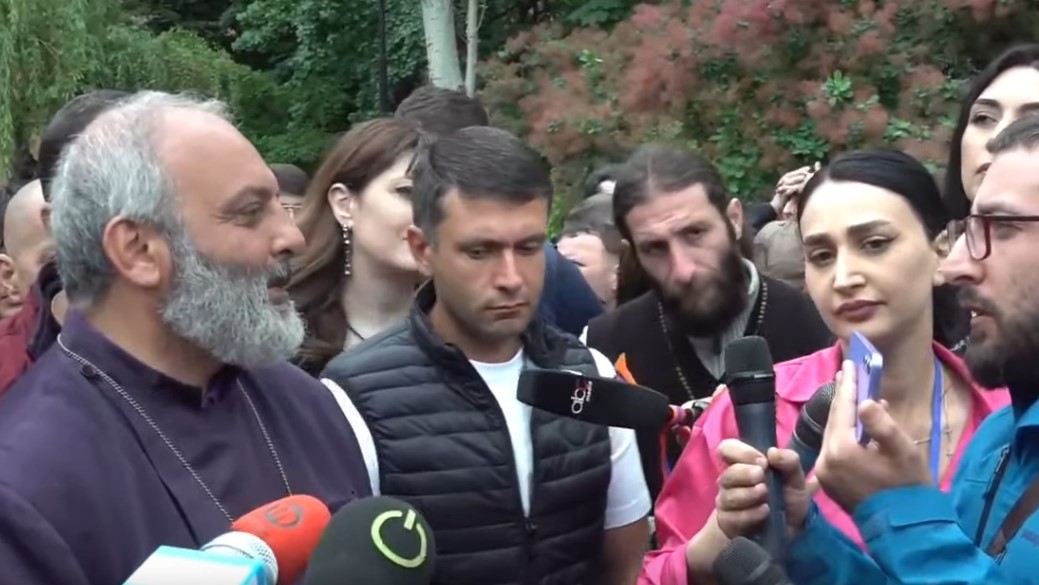
Bagrat Galstanyan in Yerevan (screenshot youtube)
Between 20 and 30 thousand demonstrators, led by Archbishop Bagrat Galstanyan, protested in the Armenian capital to oppose the current demarcation process between Armenia and Azerbaijan, following the Nagorno Karabakh war, and to demand the resignation of the prime minister
Last Thursday, ahead of the meeting of the Armenian and Azerbaijani Foreign Ministers in Almaty, Kazakhstan, around 20-30,000 protesters gathered in Yerevan’s Republic Square to oppose the demarcation process that has started in part of northeastern Armenia. The rally was preceded by a 170-km march led by the Archbishop of the Tavush region, Bagrat Galstanyan. Dressed in a white robe, rather than the usual black, Galstanyan called for the resignation of Armenian Prime Minister Nikol Pashinyan.
Beside him were members of Armenia’s opposition and representatives of various militant groups, including Hampig Sassounian, who was convicted of assassinating the Turkish Consul General in Los Angeles in 1982 until his controversial parole in 2021. Gyumri-born Galstanyan, formerly an Archbishop of the Armenian Apostolic Church in Canada, is known for participating in Armenian Revolutionary Federation – Dashnaktsutyun (ARF-D) rallies to depose Pashinyan and obstruct Armenia-Azerbaijan normalisation in 2022.
His involvement has raised questions as to the separation of Church and State in Armenia. "A cleric cannot say a political text without the permission or instructions of the Catholicos of All Armenians”, said Pashinyan in a live televised interview on 7 May. “It is obvious that the leader of the process is the Catholicos of All Armenians, and the beneficiary is [former president] Robert Kocharyan”.
Speaking at the rally, the charismatic and populist cleric barely touched upon the delimitation and demarcation process, instead demanding Pashinyan resign within one hour. A 15-minute extension also failed. Galstanyan later met with representatives of Kocharyan’s Hayastan and Serzh Sargsyan’s Pativ Unem opposition parliamentary blocks, mainly consisting of Dashnaktsutyun and the Republic Party, to discuss their next steps.
The parties agreed to again call for a vote of no confidence for Pashinyan through a parliamentary vote, though they need 36 deputies to do so. Kocharyan and Sargsyan’s bloc only has 35 in the 107-seat National Assembly. Meanwhile, the second rally called by Galstanyan attracted far fewer participants, estimated at around 11,000. The third, held on Sunday, attracted just 9,000. With attendance noticeably dwindling over such a short time, rallies were halted and his supporters will now meet every day at a nearby church.
Galstanyan did, however, call for a resumption of a campaign of civil disobedience in the city starting Monday. By mid-day, 151 people had been detained by police. Many observers believe that, despite the initial novelty of a priest-led march and demonstration, its association mostly with parties close to former president Robert Kocharyan as well as the Armenian Catholicos has already damaged the fledgling movement. Even so, Galstanyan continues to call for Pashinyan’s ouster.
"We need a new government, a government of the people, a caring, suffering government, a government of reconciliation”, he told protesters. Kocharyan’s former Foreign Minister, Vardan Oskanyan, also surprised many by saying on Friday that the Prime Minister of such a government could be Galstanyan himself, who is however unfit as he also holds Canadian citizenship. That, however, does not appear to have stopped him from hinting the same.
“If the people want [it], and the Armenian Patriarch will bless [it], who am I to say no?”, Galstanyan told media. With low numbers, however, that seems unlikely even if the opposition impeached Pashinyan, whose Civil Contract party still holds a majority in the Armenian National Assembly. The government continues to allege that the protests are coordinated by Kocharyan and Sargsyan, widely unpopular figures in Armenia even if Pashinyan’s ratings have slipped.
Galstanyan maintains that he is not against peace or demarcation, but the rhetoric from the protest actions says differently. The United States and European Union have welcomed the border agreement and on Monday the French Foreign Ministry urged the sides to continue the process. On Sunday, a group of former diplomats aligned with Galstanyan claimed that basing demarcation on the 1991 Almaty declaration, as had been agreed, was “illegal" and would face “criminal" repercussions.
The following day, Armenian Foreign Minister Ararat Mirzoyan did not hold back in his response."By undermining the Almaty declaration and the peace process based on it, these people continue […] to undermine the sovereignty, statehood, and territorial integrity of Armenia. In the best interpretation, without realising it, [but] in the worst interpretation, at the direct dictation of another country”, he said in a veiled reference most probably to Russia.
















 To Top
To Top